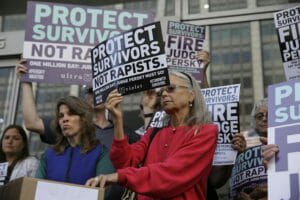Campus Anti-Fascist Network Defends Teacher Harassed by Far Right
An issue centering on a Stanford University professor has raised larger questions about the obligation to provide “balance” on controversial topics, especially at educational institutions. Campus Antifascist Network
Campus Antifascist Network
The Campus Anti-Fascist Network, an organization representing over 2,000 students, faculty and staff at hundreds of American universities, has released a statement of solidarity with Stanford University professor David Palumbo-Liu, who the group says has been harassed by Fox News, the Stanford Review and the alt-right because of his affiliation with it.
Inside Higher Ed provides context for the case:
Nearly 600 supporters of David Palumbo-Liu … signed an open letter asking his institution to “enunciate a strict code of ethics for journalists, distinguishing between opinion pieces and news reporting.” The letter was prompted by a recent article in an independent student newspaper, The Stanford Review, about Palumbo-Liu’s affiliation with the Campus Antifascist Network, calling it “undeniably a chapter of a terrorist group” that embraces “vigilante thuggery.” Fox News picked up the piece, as did several right-wing websites, and Palumbo-Liu says he’s since received graphic death threats and other hate mail from across the country.
The open letter from Palumbo-Liu’s supporters says, “The [Stanford] Review provides no evidence whatsoever for their claim that Palumbo-Liu is a member of a terrorist organization. Such reckless and inflammatory statements violate not only journalistic standards but also Stanford’s Fundamental Standard, and they ultimately endanger all of us.”
The Campus Antifascist Network denied in the press release that it promotes violence:
While we recognize the need for, and right to, self-defense for individuals and communities who are directly targeted by fascist violence, the Campus Antifascist Network does not advocate, and has never advocated, for initiating violence. Our mission statement is clear. CAN has diverse political views on multiple issues, but we are united in our commitment to stopping fascist intimidation from taking root in our campus communities.
The controversy involving Palumbo-Liu and the Campus Antifascist Network raises questions about the hysteria surrounding the antifa (short for anti-fascist) movement and the issue of whether college campuses have an obligation to provide “balanced” airing of political issues.
Matthew James Seidel writes on AlterNet:
Universities may be a place where ideas can be freely debated, but the value of a human being is not up for debate. When Charles Murray argues black people are genetically inferior to white people, his ideas are not abstractions to the black students at the universities that allow him to present his morally repugnant and scientifically baseless views. Even if we were to say that these sorts of ideas should be debated, what exactly is there to debate? Is it really necessary to treat the ideas of people like Murray or Ann Coulter or Spencer as if they are worthy of consideration?
The clash between the far-right and antifa college students has been palpable since the election of President Trump. Left-wing student protesters at the University of California at Berkeley shut down a talk by far-right writer and speaker Milo Yiannopoulos, setting fires, breaking windows and generally causing chaos on campus. Yiannopoulos had been invited to speak by the Berkeley College Republicans, who have since filed a lawsuit against the school over cancellation of the speech.
Time magazine writes that while debates about who is given a platform on university campuses has been going on for centuries, the recent disagreements have been more potent and dangerous. Berkeley Mayor Jesse Arreguin said, “This level of political violence is something we have not seen before. This is a new situation.”
Adam Johnson writes at FAIR (Fairness & Accuracy in Reporting) that attempts from the media to cover both sides of the immigration debate have obstructed understanding of the issues. Johnson brings up the Center for Immigration Studies, which he says since January 2017 has “taken an outsized role in American media as Trump’s go-to defender for his overtly white nationalist immigration policies”:
Your support matters…There’s one problem with this: The Center for Immigration Studies is, according to the Southern Poverty Law Center (SPLC), a hate group with a long, documented history of nativist and white nationalist leanings. Over the past month alone, leading papers like the Washington Post, New York Times and Wall Street Journal have boosted and normalized CIS, using them to “balance” out their stories on Trump’s anti-immigrant initiatives. …
This inclination speaks to the pitfalls of “balance” as an overarching principle. One of the more subtle ways the media normalize Trump is by normalizing previously fringe groups that have grown more powerful in his orbit. Not giving these hate groups a platform would be ideal; disclosing their white nationalist ties when quoting them should be the bare minimum.
Independent journalism is under threat and overshadowed by heavily funded mainstream media.
You can help level the playing field. Become a member.
Your tax-deductible contribution keeps us digging beneath the headlines to give you thought-provoking, investigative reporting and analysis that unearths what's really happening- without compromise.
Give today to support our courageous, independent journalists.






You need to be a supporter to comment.
There are currently no responses to this article.
Be the first to respond.